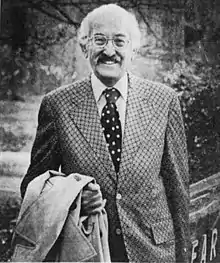David S. Breslow
David S. Breslow (August 13, 1916 – May 26, 1995) was an American industrial chemist best known for his work on polymers.[1][2]
David S. Breslow | |
|---|---|
 Breslow in November 1982 | |
| Born | August 13, 1916 New York City, U.S. |
| Died | May 26, 1995 (aged 78) Newark, Delaware, U.S. |
| Resting place | Jewish Community Cemetery, Brandywine Hundred |
| Alma mater | |
| Spouse(s) | Ann Goodman Breslow |
| Children | 3 |
| Scientific career | |
| Fields | Polymer chemistry |
| Institutions | |
Early life and education
Breslow was born on August 13, 1916,[3] and raised in Queens, New York.[2] He developed an early interest in chemistry after inheriting a chemistry set which he and a friend used to make stink bombs.[4] He graduated from City College of New York in 1937 and subsequently earned a doctorate in organic chemistry from Duke University in 1940.[5][6] During World War II, he did post-doctoral work at the California Institute of Technology and research at the University of California, Berkeley and Duke.[2][6]
Career
In 1946, he joined the chemical manufacturing company Hercules.[2] He rose through the ranks, and in 1971, he was named senior research associate of the New Enterprise Department, the top technical position at the company.[7]
His research focused on polymers.[1] He helped develop catalysts for the chemical reactions that produce polyethylene and polypropylene, and worked on the stabilization of those materials, leading to a wide array of consumer plastics applications.[1] He also conducted research on the potential use of copolymer MVE-2 as a cancer drug.[8][4]
He taught part-time at the University of Delaware from 1972 to 1987.[5] During the 1964–1965 academic year, he took a sabbatical at the University of Munich in Germany,[7] and in 1971 he taught at the University of Notre Dame.[5]
Over the course of his career, he acquired 79 patents[2] and authored 90 scientific papers as well as a two-volume textbook on polymers.[5]
He was president of the Delaware chapter of the American Chemical Society (ACS), and later served on the national ACS board of directors.[9]
Retirement and death
Breslow retired in 1982.[2] In 1988, he received the ACS Award in Applied Polymer Science.[10] He died on May 26, 1995, at Christiana Hospital in Newark, Delaware.[1]
Personal life
Breslow married Ann Goodman after World War II.[2] They had three children[1] and lived in Brandywine Hundred outside Wilmington, Delaware.[2] He was a member of Congregation Beth Shalom.[2]
Works
- Breslow, David S. (1966). The Chemistry of Heterocyclic Compounds: Multi‐Sulfur and Sulfur and Oxygen Five‐ and Six‐Membered Heterocycles. New York: Interscience Publishers. ISBN 978-0-470-38196-0.
References
- "David Breslow, 78, Plastics Researcher". The New York Times. June 3, 1995. p. 11. Retrieved December 5, 2020.
- "David S. Breslow, 78, Hercules Corp. chemist". The News Journal. May 29, 1995. p. 6. Retrieved December 6, 2020 – via Newspapers.com.
- "David S. Breslow in the U.S., Social Security Death Index, 1935-2014". Social Security Administration. Retrieved December 6, 2020 – via Ancestry.com.
- Davidson, Henry F. (November 19, 1982). "Cancer-fighting hope is seen for Hercules drug". The Morning News. p. 40. Retrieved December 6, 2020 – via Newspapers.com.
- "David S. Breslow". The Philadelphia Inquirer. June 1, 1995. p. 26. Retrieved December 6, 2020 – via Newspapers.com.
- "ACS To Hear Hercules Scientist". The Cumberland News. January 29, 1969. p. 12. Retrieved December 6, 2020 – via Newspapers.com.
- "Hercules fills top technical post". The Morning News. December 22, 1971. p. 45. Retrieved December 6, 2020 – via Newspapers.com.
- DeVries, Julian (April 14, 1980). "Modified chemical believed new cancer weapon". The Arizona Republic. p. 15. Retrieved December 6, 2020 – via Newspapers.com.
- "Breslow on ACS Board". The News Journal. December 7, 1972. p. 57. Retrieved December 6, 2020 – via Newspapers.com.
- "Polymer award goes to Breslow". The Morning News. May 9, 1988. p. 37. Retrieved December 6, 2020 – via Newspapers.com.